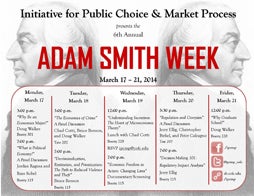Adam Smith Week at the College of Charleston is named for the “Father of Modern Economics” and creates awareness and discussion about important economic topics. The annual week takes place from March 17 through 21, 2014 and is hosted by the Initiative for Public Choice and Market Process (IPCMP) in the School of Business.
“Adam Smith is one of the most recognizable figures in economics, and his contributions to the fields of philosophy and economics are still relevant today,” says Pete Calcagno, Ph.D, associate professor of economics and director of the IPCMP. “His concept of the invisible hand is considered the classic statement on laissez faire capitalism.”
Monday, March 14, 2014
“What is Political Economy?: A Panel Discussion” with College of Charleston Political Science Professor Jordan Ragusa and Russ Sobel 7 p.m. in room 115 of the Beatty Center (5 Liberty St.)
Tuesday, March 18, 2014
“The Economics of Crime: A Panel Discussion” with Chad Cotti, Bruce Benson, and College of Charleston Finance Professor Doug Walker 3 p.m. in room 202 of the Tate Center (5 Liberty St.)
“Decriminalization, Restitution, and Privatization: A Path to Reduced Violence and Theft” with Bruce Benson at 7 p.m. in room 115 of the Beatty Center (5 Liberty St.)
Wednesday, March 19, 2014
A documentary screening of “Economic Freedom in Action: Changing Lives” at 7 p.m. in room 115 of the Beatty Center (5 Liberty St.)
Thursday, March 20, 2014
“Regulation and Cronyism: A Panel Discussion” with Jerry Ellig, Christopher Birkel, and College of Charleston Economics Professor Peter Calcagno at 3:30 p.m. in room 202 of the Tate Center (5 Liberty St.)
“Decision-Making 101: Regulatory Impact Analysis” with Jerry Ellig at 7 p.m. in room 115 of the Beatty Center (5 Liberty St.)
Who is Adam Smith?
Adam Smith’s 1776 book, An Inquiry into the Nature and Causes of the Wealth of Nations, is one of the most important works in economics. One of best known ideas explained in the book is that of the “invisible hand” of the market, the idea that individuals’ self-interest often promotes society’s interests. A commonly quoted passage that illustrates this is:
“It is not from the benevolence of the butcher the brewer, or the baker that we expect our dinner, but from their regard to their own interest. We address ourselves, not to their humanity, but to their self-love, and never talk to them of our own necessities, but of their advantages.”
About the Initiative for Public Choice & Market Process
Founded in the fall of 2008, the Initiative for Public Choice & Market Process advances the understanding of the economic, political and moral foundations of a free market economy. The Initiative for Public Choice & Market Process supports the growth and development of teaching and research at the College of Charleston School of Business while engaging students and the Charleston business community. Visit sb.cofc.edu/pcmp to learn more.
About the School of Business
College of Charleston’s School of Business offers seven undergraduate programs, a master’s in accountancy and an honors program. Approximately 1680 undergraduate and graduate students attend from as far away as China, Germany and Brazil. The faculty has research expertise in areas such as financial investment, bankruptcy, global logistics, political economics, business intelligence, hospitality and tourism and sustainable business practices. Visit sb.cofc.edu to learn more.




